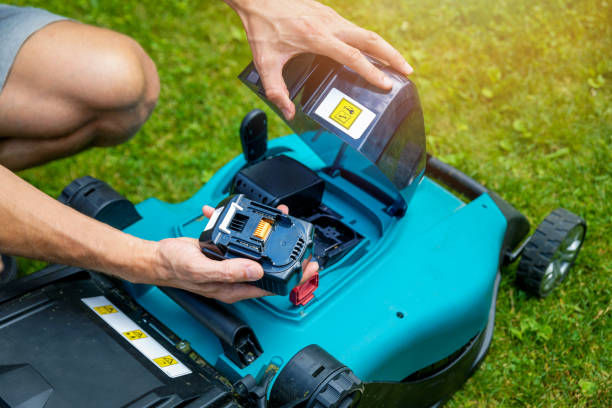Introduction
When it comes to maintaining your lawn, the efficiency and power of your lawn mower are crucial. Central to this power is the lawn mower battery, but how many volts are in a lawn mower battery? This article will explore the different types of batteries used in lawnmowers, their voltage ranges, and how you can maintain and check your mower’s battery for optimum performance.
Understanding the Power Needs of Your Lawn Mower
The voltage of a lawn mower battery dictates the power capacity of the mower itself. Typically, lawn mower batteries range between 12 volts to 40 volts, with various types suited for different mowing needs. Understanding these requirements is essential for ensuring your lawn mower operates efficiently and effectively.
Types of Lawn Mower Batteries

Lead-Acid Batteries: The Traditional Choice
Lead-acid batteries have been the standard in lawnmowers for decades. They are perfect for larger lawns or more demanding tasks because of their reliability and higher voltage outputs.
Lithium-Ion Batteries: The Modern Upgrade
Lithium-ion batteries represent the latest in battery technology, offering lighter weights and longer lifespans without the memory effect associated with older types. These batteries are typically found in the 36 to 40-volt range, suitable for modern cordless models.
Factors Influencing Lawn Mower Battery Voltage

Battery Capacity and Its Role
The capacity of a battery, measured in ampere-hours (Ah), directly influences its voltage and, consequently, the mower’s performance. Higher capacity batteries can deliver more consistent voltage and longer usage times.
The Impact of Temperature on Battery Efficiency
Temperature plays a crucial role in the performance of lawn mower batteries. Extreme temperatures can affect the voltage output and efficiency, with cold weather typically reducing battery efficiency.
How to Check the Voltage of Your Lawn Mower Battery
Knowing how to check the voltage of your lawn mower battery can help you maintain its health and ensure it’s always ready for use.
Tools Needed for Measuring Battery Voltage
To check the voltage, you’ll need a multimeter or a specialized battery tester, tools that can accurately read the electrical output of your battery.
Step-by-Step Guide to Measuring Voltage
- Ensure your lawn mower is off and cool.
- Locate the battery and clean any corrosion from the terminals.
- Connect the multimeter and read the voltage output.
Maximizing the Lifespan of Your Lawn Mower Battery
Best Practices for Battery Maintenance
Regular maintenance includes cleaning the terminals, ensuring tight connections, and storing the battery in a cool, dry place during the off-season.
Troubleshooting Common Battery Issues
From failing to charge to experiencing a voltage drop, understanding common issues can help you quickly resolve them and extend the life of your battery.
Conclusion: Ensuring Your Lawn Mower’s Battery Health
Understanding how many volts are in a lawn mower battery and how to maintain it can make a significant difference in the performance and lifespan of your lawn mower. By following the tips and guidelines outlined in this article, you can ensure that your lawn mower is always ready for the task at hand, providing reliable performance season after season.
FAQs
What is the average lifespan of a lawn mower battery?
The average lifespan of a lawn mower battery varies between three to seven years, depending on the type and maintenance.
Can I upgrade my lawn mower battery to a higher voltage?
Yes, you can upgrade your lawn mower battery to a higher voltage, but ensure compatibility with your mower’s electrical system.
How do I properly dispose of an old lawn mower battery?
Properly dispose of old lawn mower batteries at recycling centers or hazardous waste facilities.
What are the signs that my battery needs replacing?
Signs include slower start-up, reduced performance, or physical damage to the battery.
How does the battery voltage affect the performance of the mower?
Higher voltage means more power and better performance; lower voltage may lead to reduced efficiency.
Is it better to remove the battery when not in use?
Yes, removing the battery during extended periods of non-use can prolong its lifespan.











Leave a Reply